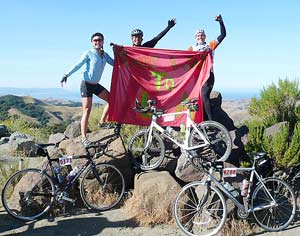UC Berkeley Web Feature
Bears on bikes
Day 4: Catching the spirit
of the event
 Follow the ride:
Follow the ride: • Day 6: Climbing that last hill, with miles yet to go
• Day 5: Two perspectives on ride's Dress Red Day
• Day 4: Catching the spirit of the event
• Day 3: Missing out on 72.3 miles of fun
• Day 2: Part endurance event, part circus, part therapy
• Day 1: Working, sacrificing, sending a message
• Cal
LifeCyclists get in gear
Devin Wicks is director of Fitness Operations at UC Berkeley’s Recreational Sports Facility, a Cal alum, and AIDS LifeCycle 6 rider no. 4286.
SANTA MARIA –There are some things that you don't want to think about at 4:45 in the morning, especially after having ridden a bike 275 miles over the previous three days. One of the foremost is getting back in the saddle to ride another 96. However, as the sound of my tent mate's alarm clock pierced the chilled morning air at, yes, 4:45 a.m. … it was don the Lycra and full-steam ahead.
One of the most amazing things to witness is an early morning in camp on the AIDS/LifeCycle. Blurry-eyed, chilled, and sore, more than 2,300 cyclists and nearly 500 roadies begin to buzz as they prepare for the next leg of their journey. Today's ride: the 96-mile stretch from Paso Robles to Santa Maria — taking cyclists over the coastal range via one of the ride's most infamous sets of climbs, the "Evil Twins," and through some of the most beautiful coastal and valley regions of California.
But before the first roll-out of riders begins, we have to collapse the equivalent of a 3,000 person city, and get it on the road to the next camp. This is no small task. The first challenge is figuring out how to re-pack your 70 allotted pounds of personal gear — perfectly packed in your bag prior to the ride and now a tossed-together mess and seemingly impossible packing feat. Then it's roll up the tent, stuff it back in the bag, and make your way to breakfast.
Feeding nearly 3,000 people in less than three hours is another amazement to behold. In Paso Robles, for instance, you walk into a warehouse on the County Fair Grounds to find rows and rows of tightly packed tables and some of the most amazing volunteers you'll ever meet — many of whom woke up at 3 a.m. to set up breakfast for the hungry riders and serve up the meals with a warm smile and a "Good morning, rider."
 Celebrating "Halfway to L.A." |
After eating a well-prepared meal and reading the morning edition of the camp newsletter, you head back to your tent site to schlep your stuffed bag and packed tent to your waiting gear truck. As you do this — dodging 2,300 other riders doing the same thing — you wonder if you have the energy to make it through the day.
At your gear truck you find yet another amazing group of men and women, all volunteers, whose job it is to load and unload (and often times carry directly to tent sites) gear for you and 199 other riders. Here, without skipping a beat, you're greeted with "Good morning, rider. Have a great ride and be safe out there."
At this point you start to catch the spirit of the event … and it's infectious. All the energy that is poured into making sure that you are cared for, safe, and well-supported starts to take hold of you — and you begin to believe that, yes, you can make it.
You find your way to bike parking, where there are volunteers waiting to fill your water bottle (with your choice of sports drink or water) and bike-techs who will do last-minute tweaking of your cycle, to ensure that you have a smooth and safe journey — each one of them greeting you with a hearty "Good morning, riders. Have a safe ride and remember to hydrate, urinate, and lubricate."
Finally, it's time to mount your cycle — though you've been on that hard saddle for three days and your backside has no desire to sit on it one more minute, never mind another four days. But you carefully ease into the saddle and begin pedaling out, to cheering crowds, heading toward the half-way point of this ride, those Evil Twins.
Truly the stars of the AIDS LifeCycle are all the men and women who volunteer their time to make sure you have medical attention, food, bike repairs, an organized camp, and a cheerful start to a challenging day. I am often asked what it's like to be on the ride. My response: it's like one week where the world is what you'd like it to be — everyone helping and supporting each other around a common goal.

